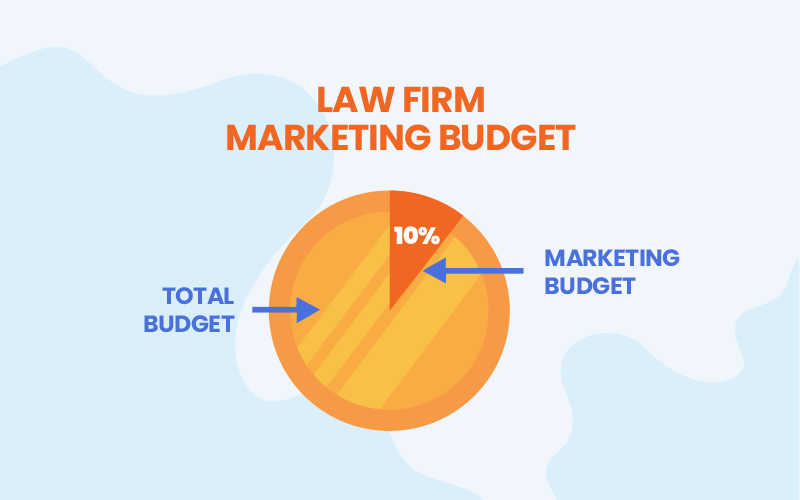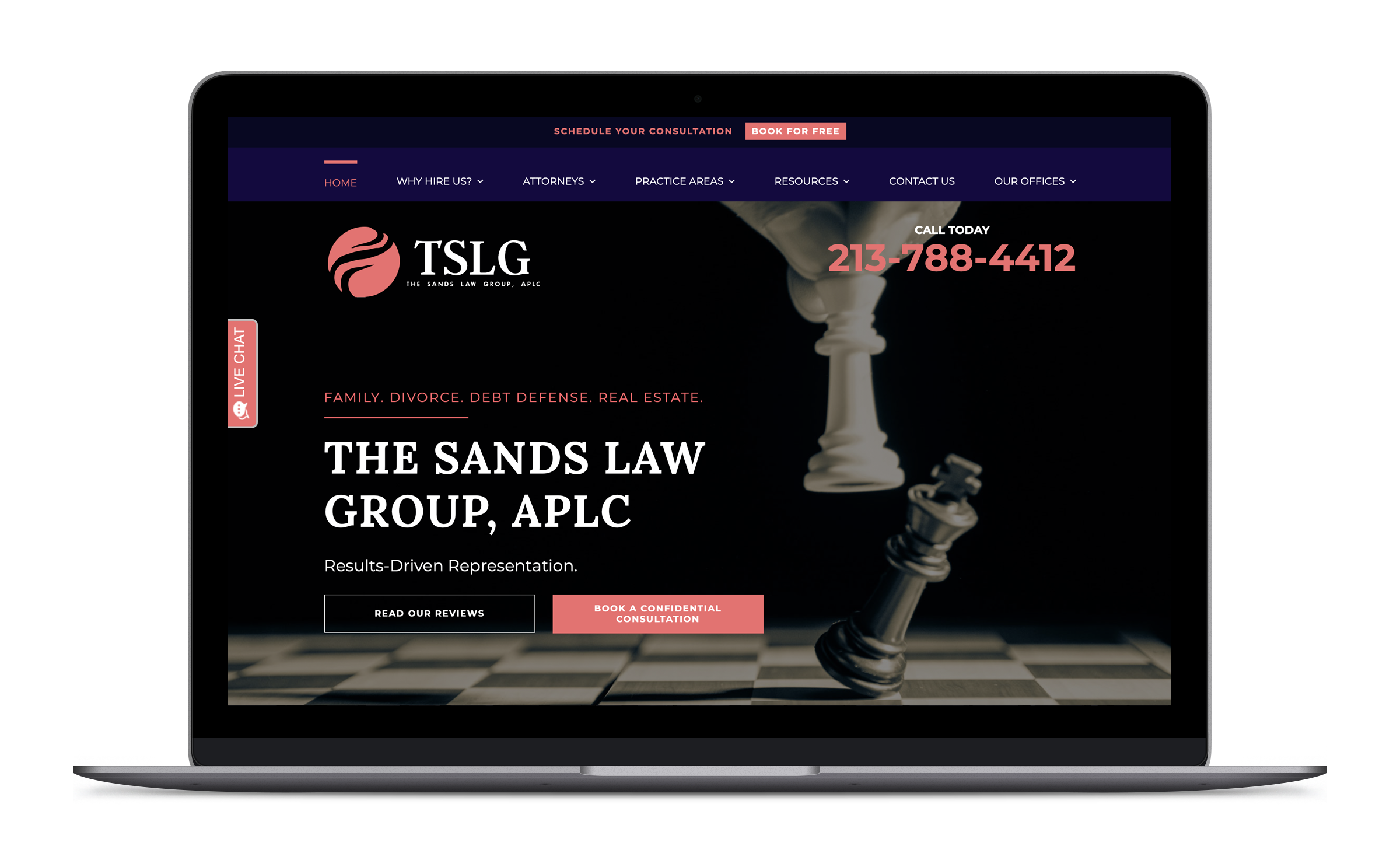
Law firm marketing in 2025 is more competitive than ever.
Whether you’re running a solo practice or managing a growing firm, getting consistent leads online is a challenge.
I’ve worked with law firms across nearly every practice area. The ones that grow consistently are the ones that treat marketing like a core business function. They have a plan, they set a budget, and they use systems that help bring in clients reliably.
This guide will walk you through how to do the same. You’ll learn what law firm marketing really means, how to build a strategy that fits your goals, and which digital marketing tactics deliver the best results.
Everything you need to start marketing your law firm more effectively is right here.
Before diving into specific marketing tactics, it’s important to understand the foundation of how law firm marketing works. This includes how it’s evolved, what makes it unique, and why it’s critical for firms of any size to take it seriously.
Law firm marketing is the process of promoting legal services to attract new clients and grow a firm’s visibility and reputation.
It includes everything from word-of-mouth referrals to advanced digital campaigns.
While traditional marketing tactics like radio ads and networking events still have a place, digital marketing now leads the way in terms of reach, precision, and return on investment.
At its core, marketing for lawyers is about building awareness, earning trust, and making it easy for the right clients to find and choose your firm.
The most effective firms use a combination of strategies, from optimizing their website to running Google Ads, to stay visible and competitive.
When law firms start investing in marketing, the first decision is often whether to go traditional or digital. The right approach depends on your audience, practice area, and goals.
Understanding the difference helps you make smarter choices.
Traditional marketing includes radio ads, print, direct mail, and local networking.
Digital marketing includes SEO, PPC, social media, and email campaigns.
Most firms use a mix. Digital provides the foundation. Traditional tactics can support the strategy when used intentionally.
If I had to recommend either digital or traditional marketing for a law firm today, it wouldn’t even be close. Digital wins.
I’ve seen it firsthand: the firms that invest in their online presence are the ones pulling ahead. They’re everywhere their potential clients are looking.
This shift isn’t a theory. It’s backed by real numbers:
Despite this, many firms still hold back. Only 57% have a dedicated marketing budget. Among solo attorneys, that number is zero.
That’s the gap and the opportunity.
Digital marketing is more affordable, more targeted, and easier to measure than traditional tactics. It’s also the best way for smaller firms to compete. With the right strategy, a solo criminal defense lawyer can outrank national firms in their local search results.
You don’t need a billboard on every highway. You need to appear when someone searches “DUI lawyer near me.”
Marketing a law firm isn’t like marketing other businesses. Legal advertising is regulated at both the national and state level, and the rules are there for a reason. Staying compliant is essential for protecting your reputation and license.
The American Bar Association (ABA) provides general guidance through Rule 7 of the Model Rules of Professional Conduct, which covers how lawyers can advertise their services. But the specifics vary by state, so it’s important to know your jurisdiction’s rules before launching a campaign.
Here are a few common areas to keep in check:
It’s smart to review your content with a legal marketing expert or ethics consultant before going live, especially if you’re using testimonials, video, or aggressive calls to action.
Even the best strategy can fall flat without a budget behind it.
Knowing how much you can spend and how to track its impact helps you market with confidence and avoid wasting resources. It all starts with a realistic, goal-driven budget.
You don’t need a massive budget to market your law firm effectively, but you do need a plan.
A clear budget keeps your spending focused and aligned with your goals. It also makes it easier to scale what works and cut what doesn’t.
While there’s no one-size-fits-all number, many firms allocate between 2% and 5% of their gross revenue to marketing. Solo and small firms aiming for faster growth (or those in competitive markets) may invest up to 10%.
According to Thomson Reuters, top-performing firms typically spend around 1% to 2% of revenue on marketing, not including salaries. Pre-pandemic benchmarks were closer to 2% to 3%.

Here’s how to shape a budget that fits your firm:
Once your total budget is set, the next step is figuring out how to divide it across digital and traditional channels.
Once you’ve established your total marketing budget, the next step is to decide how to distribute it across various channels.
While each firm is unique, here’s our recommendation based on what works best in 2025:
For most law firms, especially solo and small firms, digital marketing must lead. SEO, PPC advertising, content marketing, email campaigns, and social media offer scalability, measurability, and high return potential.
These channels let you reach people actively searching for legal help, track campaigns in real time, and optimize for performance.
Offline tactics like print ads, billboards, or radio spots can support brand visibility, particularly in consumer-focused practice areas like personal injury or elder law.
These tools work best in local markets with less digital saturation. Use them sparingly and strategically, not as your primary focus.
Networking events, community workshops, bar association sponsorships, and referral cultivation still deliver high-quality leads often at a low cost. These channels are ideal for practices rooted in local relationships or specific industries.
Finally, review your channel performance quarterly.
Monitor conversion rates and the cost per lead. Shift funds away from underperforming tactics and invest more in channels that consistently deliver positive ROI.
This balanced, adaptable approach gives you the best chance at sustained growth in a competitive legal landscape.
To get the most out of your marketing budget, you need to know what’s working. These metrics help you evaluate performance, optimize campaigns, and make better decisions about where to focus your time and money.
Start by tracking two or three of these that match your goals. As your strategy evolves, your metrics will help you focus on what’s actually moving the needle.
Your brand is more than a logo. It’s how potential clients perceive your firm before they ever speak to you.
A strong digital presence reinforces your credibility, builds trust, and helps you stand out in a crowded market.
In this section, we’ll cover how to shape your brand, optimize your website, and create content that supports real growth.
Branding isn’t just for big firms or flashy industries. It’s a key part of how prospective clients decide whether to trust you. Your brand communicates your values, voice, and the kind of experience people can expect when they work with your firm.
Start by defining the core elements of your brand:
A clear and consistent brand identity builds trust. When everything, from your website copy to your intake emails, feels aligned, prospective clients are more likely to feel confident reaching out.
Your website is often the first real impression a potential client has of your firm. If it’s slow, hard to navigate, or confusing, they’ll move on and likely hire someone else. A well-optimized site helps you build trust, showcase your expertise, and convert visitors into leads.
Focus on these key elements:
Even if you’re just starting out, don’t cut corners on your site. It’s your digital storefront. A fast, clean, and helpful site signals professionalism and gives potential clients a reason to trust you.
Content is one of the most effective ways to build trust before a potential client ever contacts your firm. When your content is clear, informative, and genuinely helpful, it positions your firm as a credible resource — not just a service provider.
Start with foundational pages:
Search engines prioritize helpful, relevant content. More importantly, so do real people.
If your website feels like a trusted resource, not a sales pitch, you’re more likely to win the client’s confidence and their business.
Thought leadership sets your firm apart by demonstrating your knowledge and credibility. When you consistently share useful insights, you show potential clients that you understand the issues that matter.
Start by sharing knowledge where your clients and peers already are:
Becoming a trusted voice in your practice area builds long-term credibility. It also improves your visibility in the spaces where clients are already looking for help.
Digital marketing isn’t just one strategy. It’s a collection of proven channels that work together to attract, convert, and retain clients.
Whether you’re a solo attorney or a growing firm, understanding these core tactics will help you make smarter marketing decisions and grow faster.
In this section, we’ll walk through the digital strategies every law firm should consider.
SEO in 2025 is data-driven, highly competitive, and powered by AI.
At JurisPage, we helped Sands Law Group rise above the dense Los Angeles legal market by tailoring digital content to real client search behavior, from child custody inquiries to divorce proceedings.
Google now prioritizes content that demonstrates expertise and relevance through AI evaluation, contextual understanding, and user engagement signals
In other words, legal blogs must be deeply helpful, authoritative, and aligned with real client intent.
At JurisPage, we helped Sands Law Group stand out in one of the most competitive legal markets in the country — Los Angeles.
Our strategy focused on building out deeply optimized practice area pages tailored to the way real families in LA search online. Instead of generic copy, we crafted content that addressed specific concerns like how to file for custody, modify visitation, or understand California’s divorce timelines.
This hyper-local, intent-driven content helped Sands Law Group climb the search rankings, earning greater visibility and a consistent stream of qualified traffic. Even in a saturated market, the firm saw a meaningful increase in online leads and client inquiries without needing to rely on paid ads.

To get great results, firms need:
SEO builds sustainable visibility. Done right, it keeps sending qualified visitors to your site long after you hit “publish.”
If SEO is a long game, pay-per-click (PPC) advertising is your shortcut to the top of the search results.
With Google Ads, law firms can appear above the organic listings when people search for legal help—exactly when intent is highest.
But running PPC in 2025 takes more than throwing money at keywords. The most successful firms pair precision targeting with clear landing pages and compelling copy.
At JurisPage, we helped Immigration Desk scale their online visibility with a tightly managed Google Ads campaign focused on family-based immigration services. Rather than bidding broadly, we targeted the exact phrases potential clients searched in their geographic area.

We then drove traffic to conversion-optimized landing pages with simple intake forms and clear, reassuring messaging.
The result? A dramatic increase in qualified leads and significantly improved cost per conversion.
Here’s what makes modern PPC work for law firms:
With the right setup, PPC can deliver consistent leads quickly. It’s one of the fastest ways to gain visibility, especially for new firms or competitive practice areas.
Content is the backbone of your digital presence. When it’s done right, it brings in traffic, earns trust, and helps convert visitors into clients.
In 2025, effective content shows potential clients that you understand their legal concerns and can offer clear, practical guidance.
No matter your practice area, your content should answer real client questions and reflect your expertise. Different formats serve different purposes, but together, they create a more complete digital presence.
Here are the formats we recommend for most law firms:
The right mix of content depends on your practice areas, goals, and audience. But no matter your focus, the goal is the same: to create content that informs, builds trust, and brings in qualified leads.
A good content strategy starts with clarity. What questions do your clients have? What services do you want to promote? And how can you earn trust before someone ever calls your office?
For law firms, content should mirror the way legal problems unfold in the real world. A personal injury firm might start with a post on “what to do after a car accident,” while an estate planning attorney might build out a series on wills, trusts, and healthcare directives.
Start with these core steps:
With even a basic strategy like this, your content becomes a long-term asset. It works in the background to attract traffic, educate readers, and generate leads.
Creating great content is only half the work. If you don’t promote it, even your best articles or guides might never reach the people who need them. Strategic distribution helps your firm stay visible, build authority, and keep your audience engaged.
Here’s how to make sure your content gets seen:
The more ways you share your content, the more value you get from every piece you create.
If you’re putting time into content, you need to know it’s doing its job. Tracking a few key metrics can help you refine your strategy and double down on what works.
Focus on:
Use free tools like Google Analytics, Google Search Console, or your CRM to get a clear view of performance. Even small insights can help you improve results with every new piece you publish.
Social media gives your law firm a chance to show personality, build credibility, and stay in front of potential clients.
In 2025, people expect to learn about you online before they ever pick up the phone and your social presence can shape those first impressions.
Focus on platforms where your audience is most active. LinkedIn is ideal for professional referrals or business law updates, while Facebook performs well for family law, personal injury, and immigration. Instagram and TikTok may be useful for some firms, but they require more visual storytelling and a sharper sense of your brand tone.
You don’t need to post every day. Instead, post content that builds trust and connection:
Keep the tone authentic and professional. Engage when people comment, and look for opportunities to connect in local groups or discussions.
This isn’t a quick lead engine, but it’s a long-term way to stay relevant, human, and top of mind.
AI has changed how marketing works, and law firms are feeling it. Tools powered by artificial intelligence now help create content faster, answer client questions instantly, and uncover data that used to take hours to collect.
You’ve probably seen AI used in:
But here’s the key: AI is a support tool, not a full replacement. It can speed up your workflow and help you do more with less. Still, the firms that win with AI are the ones who combine it with their own voice, experience, and judgment.
Clients hire you for trust and expertise, not a machine. Use AI to work smarter, but keep your personal touch front and center.
Traditional marketing is still worthwhile for many practice areas, like personal injury. I recommend these tactics as a complement to digital marketing, although they are often quite expensive and not great entry points for smaller law firms.
With that said, here are the main traditional marketing methods law firms use today.
Building professional networks through industry events, local bar associations, and community activities is a great way to earn referrals.
Encouraging satisfied clients to refer others to your firm can also be incredibly beneficial, as leads from word-of-mouth recommendations are some of the highest-quality leads you can get.
They’re free, so it’s not only the most effective marketing tactic but also the most cost-efficient.
Advertising in targeted publications like legal magazines and newspapers can still reach important demographics that might be online.
For example, law firms could effectively reach an older demographic with newspaper advertising.
It’s also an effective way to establish your brand so that your firm is the first choice when someone needs a lawyer.
Hosting or participating in seminars and workshops lets you showcase your expertise in specific areas of law directly to an engaged audience.
These events provide a platform for building personal connections and position your firm as an authoritative source of knowledge.
They can be particularly effective in complex legal fields where clients benefit from detailed explanations and direct interaction with legal experts. If that isn’t you, that’s okay — they are still great ways to network and earn referrals.
Direct mail campaigns are highly targeted to potential clients in specific geographic areas or demographic groups.
This tactic can be highly personalized, from hand-signed holiday cards to custom booklets that address specific legal issues.
By reaching out directly, law firms can create a tangible connection that feels more personal than digital marketing ever could, potentially leading to higher engagement rates.
Again, this isn’t ideal for all practice areas, so make sure you know your audience in and out before investing in direct mail.
Outdoor advertising isn’t necessarily the best way to generate leads, but it is the perfect way to build brand awareness.
It involves placing your ads on billboards or even on bus benches and on buses themselves — everyday spaces that your potential clients might be in.
This constant visibility helps build brand recognition, so when someone does need a lawyer, they are more likely to come to you versus another competitor.

“My website continues to dominate all the top website searches in my industry and my business has grown 10-fold as a result.”
Oykhman Criminal Defence
Radio and TV advertisements reach a wide audience and can effectively establish brand presence in a regional market (see a trend in these traditional marketing tactics?).
These mediums allow law firms to show compelling narrative ads that are tailored to broadcast during programming, aligning with the target audience’s demographic.
Note that the pricing varies heavily depending on the timeslot, the station, and even your area.
While many of these traditional marketing tactics are effective, I like to suggest them as supplements to digital marketing.
They’re great for establishing brand awareness, especially if you serve only a local area, but you’ll almost always get more cost-effective leads through digital marketing.
Once you’ve defined your strategy and chosen your channels, the next step is deciding who’s going to do the work.
Law firm marketing can be managed in-house, outsourced, or handled solo. Each option has its strengths and trade-offs. The key is to choose the approach that fits your firm’s size, budget, and bandwidth.
If you’re running a solo or small firm, doing your own marketing is often where you begin. It’s budget-friendly and gives you full control, but it also requires discipline.
The goal is to focus on the strategies that work for legal services, not general small business marketing.
Here’s how to approach it:
DIY marketing is most effective when you stay consistent and focus on tactics that speak to your specific audience—like people searching for help in your area of law.
When your firm outgrows the DIY approach but isn’t ready for an agency or in-house team, hiring a freelancer or consultant can bridge the gap. This option works well when you need specialized help with tasks like SEO, copywriting, or web design, but don’t want to commit to a long-term contract.
Look for professionals who understand legal marketing specifically. A generalist may be cheaper, but they often miss the nuances of compliance, ethics, or legal language. Ask for relevant samples, and make sure they’re familiar with the legal services your firm offers.
Freelancers are a great fit for one-off projects, like redesigning your homepage or launching a blog. Consultants can offer more strategic guidance, auditing your current marketing, creating a plan, or coaching you through setup.
Either way, success depends on clear expectations and communication. A strong brief, regular check-ins, and agreed timelines can make the relationship productive and low-stress.
Once your firm is ready to scale, a legal marketing agency can help you grow faster and with fewer mistakes. Agencies bring deep experience and a team of specialists who can manage SEO, content, paid ads, and design under one strategy.
But law firm marketing isn’t like other industries. A generic agency may get traffic, but not qualified leads. They might overlook advertising rules or use language that doesn’t reflect your professionalism. That’s why it’s essential to choose a partner that specializes in law firms.
At JurisPage, we’ve helped firms across the U.S. attract better clients with strategies built around how legal consumers search and decide. From Google rankings to site structure to lead capture, every piece is aligned with how law firms grow.
The right agency should feel like an extension of your firm. That means clear goals, transparent reporting, and strategy that’s grounded in your business, not someone else’s template.
Law firm marketing, specifically digital marketing, is how your law firm can stand out in the competitive legal landscape.
From SEO and PPC to content and social media marketing, mastering these tactics helps attract and retain clients while building your firm’s brand. But knowing the basics isn’t enough — you need a strategic plan tailored to your specific practice area and goals.
In the next chapter, we’ll explore how to create a marketing strategy that maximizes your budget and delivers measurable results.
Ready to maximize your marketing budget? Fill out the contact form or call us today for a complimentary consultation. We will listen to your story, work to define your business objectives, and recommend an approach to deliver maximum ROI for your firm.
By using this website, you consent to our use of cookies in accordance with our Cookie Policy. Cookies help us enhance your browsing experience and provide personalized content. If you do not agree to our use of cookies, please adjust your browser settings accordingly.